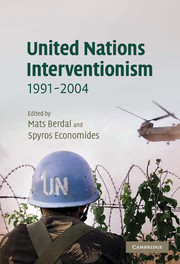9 - Sierra Leone
Published online by Cambridge University Press: 22 September 2009
Summary
Introduction
Since the early 1990s, West Africa has been an innovative laboratory for United Nations (UN) peacekeeping. In 1993, the UN deployed military observers in Liberia, alongside a regional organisation – the Economic Community of West African States (ECOWAS) Ceasefire Monitoring Group (ECOMOG) – for the first time in its history. The UN also sent military observers to Sierra Leone (UNOMSIL) in 1998 and took over ECOMOG's peacekeeping responsibilities in the country by 2000. ECOWAS peacekeepers were ‘re-hatted’ as Blue Helmets in Liberia and Côte d'Ivoire in 2003 and 2004 respectively. After providing a brief background of the domestic, regional and external dimensions of Sierra Leone's conflict, this chapter examines the evolution, performance and politics of the UN mission in Sierra Leone (UNAMSIL), as well as peacekeeping cooperation between the UN and ECOWAS.
The chapter argues that the UN (particularly the most powerful members of the fifteen member Security Council) was shamefully negligent in African countries like Sierra Leone for most of the 1990s following debacles in Somalia (1993) and Rwanda (1994). Although there was criticism of rebel atrocities, much of the international community and UN agencies failed to condemn the gross human rights abuses committed by government troops during Sierra Leone's civil war or to support disarmament efforts effectively. Indeed, Sierra Leone hardly appeared on international radar screens at all until the late 1990s. In the context of a major security vacuum and lack of strong UN interest, ECOWAS took up the burden of peacekeeping – with mixed results.
- Type
- Chapter
- Information
- United Nations Interventionism, 1991–2004 , pp. 246 - 273Publisher: Cambridge University PressPrint publication year: 2007
- 4
- Cited by



